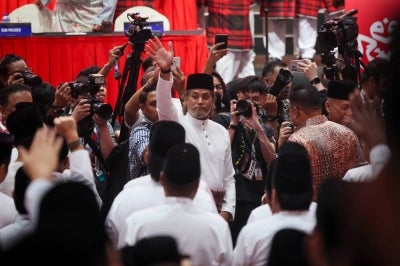Of the ostensibly forgotten deadline and PMX's upcoming Friday flexing

Two weeks were the deadline Prime Minister Datuk Seri Anwar Ibrahim set for his administration to devise a targeted subsidies plan to ease cost of living of the low-income groups.
Mind you, this cut-off period began ticking on November 27, 2022 – which was 12 weeks ago.
Regrettably, we have heard nothing since.
Not even a simple affirmation on whether such targeted subsidies plan has been tabled before him as per the deadline or if they required more time to further delve on the matter. Nada.
The need for the country to have such a plan is a no-brainer, because, for example, last year the rich inadvertently enjoyed RM20 billion worth of petrol subsidies for their big fancy cars.
Did you know that RM20 billion is triple the amount of Sumbangan Tunai Rahmah (STR) that benefits almost 9 million recipients? That’s a lot you say? Yup. Indeed, it is.
Instead, the closest glimpse of an update regarding such plan were the five working papers to combat cost of living that were scheduled to be presented at a meeting of the National Action Council on the Cost of Living on December 13, 2022.
But then again, Minister of Domestic Trade and Cost of Living Datuk Seri Salahuddin Ayub did not utter a word on targeted subsidies when he spoke about those working papers.
Sigh. Oh well, perhaps, we’ll have better luck when Anwar tables his administration’s maiden supply bill tomorrow.
Speaking of supply bill, the recent soundbites seemed to hint that Budget 2023 might be an austere one, given Anwar’s crusade to address and lower Malaysia’s RM1.5 trillion national debt and liabilities.
“It will not probably be the largest budget ever, as there will be effort to reduce spending deficit, probably below 5.5 per cent,” estimated Dr. Ahmed Razman Abdul Latiff the Director of Putra Business School’s MBA programme.
He believed so because the government needed to ensure that it will be able to continuously reduce its annual debt commitment.
“Nonetheless, Malaysia has never defaulted on its annual debt obligations as our revenue continues to increase every year,” added Ahmed.
Recession is – undoubtedly – in the air.
On Monday last week, Fitch Solutions Country Risk and Industry Research maintained its gloomy forecast on Malaysia’s economic growth where the country’s real gross domestic product (GDP) growth to slow to 4.0 per cent in 2023, from 8.7 per cent in 2022.
If such was so, will a frugal budget be the most apt tool to respond against this foreboding economic outlook? Because unlike business entities, a government needs to spend in order to flourish the economy.
“The government’s job is to spend money for the people and the money they have is from the people. Unfortunately, although the government is spending money, they are not spending it wisely,” said DM Analytics senior researcher Dr. Zouhair Rosli.
A case in point, Zouhair cited was the recently approved MRT3 which incurred the country an additional RM32 billion in debt on top of the existing guaranteed loan for DanaInfra Nasional Berhad and Prasarana Malaysia Berhad, totalling at about RM120 billion.
“MRT needs 250,000 ridership to break even. Last year, the figure was only 150,000. The public still prefer to take private transportation. Why? Because our public transport system is bad.
“And now the government wants to build MRT3? Where is the logic? If the Prime Minister wants to reduce debts, he needs to walk the talk,” Zouhair remarked.
He was also of the opinion that off-budget spending such as building mega projects must go through the Parliament prior approval.
"Be transparent. Let the 'employees of the people' [the Member of Parliament] debate about all the proposed projects. Tell the people what are the cost and how will the mega projects benefit them," he said.
Of the RM1.5 trillion, Malaysia’s actual debt is RM1.2 trillion with latest available statistics showed that a large chunk of it was that of domestic – at 97.5 per cent to be precise as confirmed by former finance minister Tengku Datuk Seri Zafrul Aziz last year.
“It means that we should not be overly worried about our fiscal situation because we are borrowing from institutions that are also governed by the government,” explained Dr. Barjoyai Bardai from Universiti Tun Abdul Razak.
These institutions he added, were – among many – the Employees Provident Fund (EPF), Retirement Fund (KWAP), Tabung Haji and Permodalan Nasional Berhad (PNB).
That being said, can a country grow its economy while, concurrently, lower its debt? According to Barjoyai, it is possible.
He said one of the ways to go about it was for a country to increase its productivity which will domino into boosting its GDP, exports, currency, and household income.
“Earnings that are triggered by increase in productivity will always be beneficial in the long run.
“Take a look at how Hong Kong and Singapore dealt the Financial Crisis in 1999; the former upped its productivity while the latter sought more foreign direct investments (FDI).
“And eventually, what happened was that Hong Kong ended up in a much better position than Singapore,” Barjoyai explained.
Having come into power for merely 13 weeks, it will not be entirely surprising if the Anwar-led government’s national budget will be fairly similar to the one tabled by former prime minister Datuk Seri Ismail Sabri Yaakob in October last year.
However, if Anwar’s administration manages to table a completely original budget, then it will further attest the credence of his 1996 Asiamoney’s accolade of being Finance Minister of Year.
Be that as it may, tomorrow will no doubt be a historical moment for Anwar – to once again, flex his budgetary dexterity as Finance Minister after his infamous sacking from the position in 1998.
Exciting, don’t you think?
Additional reporting by Hajar Umaira Md Zaki
Download Sinar Daily application.Click Here!















